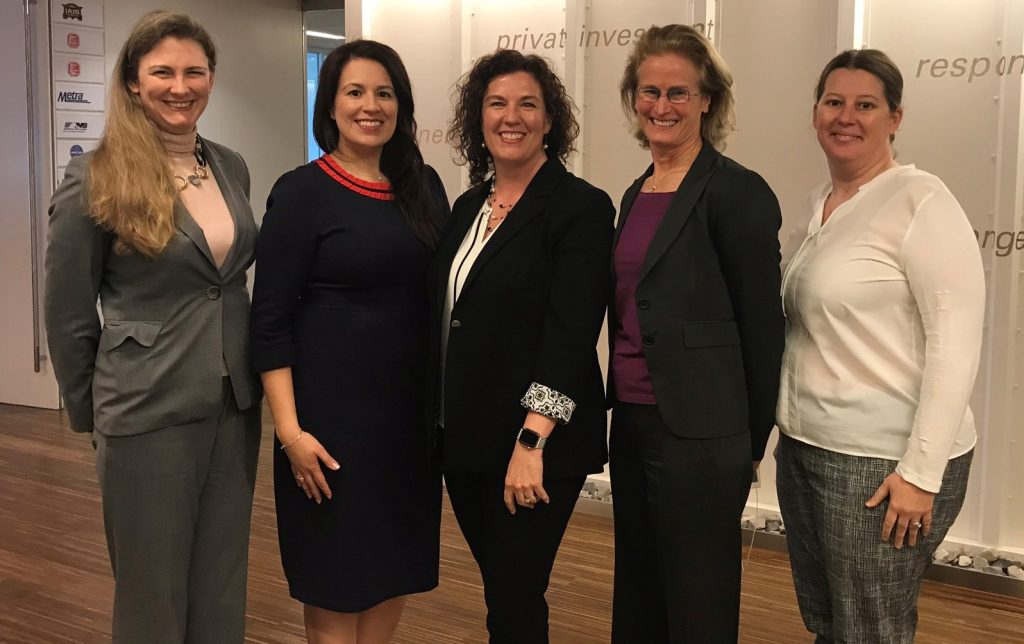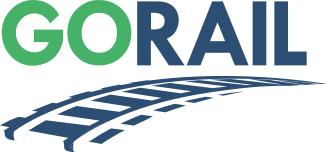Washington, DC. — The Association of American Railroad’s (AAR) three female senior vice presidents, Adrian Arnakis, Kathy Kirmayer and Kristin Smith — half of the organization’s senior leadership team — came to railroading along fairly different paths. One a Capitol Hill veteran, one an expert communicator and one a longtime litigation attorney, they each found themselves drawn to rail.

The trio discussed their paths March 20 at a special panel event hosted by the League of Railway Women (LRW), aptly titled, “Laying Their Own Tracks: Lessons From Women Leaders in Rail.” The focus was professional development, furthering LRW’s mission of connecting and cultivating women in rail.
“I always loved transportation,” said Adrian Arnakis, senior vice president of AAR Government Relations, who joined the industry in 2018. “You see trains going around, but you don’t think of the impact.” Arnakis came to AAR after 13 years in the U.S. Senate, where she started by opening mail and ended as deputy staff director for the Senate Committee on Commerce, Science and Transportation.
Kristin Smith, AAR’s senior vice president for communications, didn’t expect to work in issue advocacy or rail when she began her career as a media planner years ago. However, she embraced the unexpected and is pleasantly surprised with where it took her.
Similarly, AAR’s senior vice president of law and general counsel, Kathy Kirmayer, took a leap into the rail industry in 2015 after practicing business litigation for 25 years.
“I believe in bringing passion to the workplace,” said Kirmayer, underscoring her dedication to the industry, as well as the personal enjoyment she takes from being acutely knowledgeable about her arena.
The wide-ranging conversation, moderated by AAR Senior Economist and LRW Membership Chair Luisa Fernandez-Willey and AAR Assistant General Counsel and LRW Parliamentarian Sarah Yurasko, touched on career barriers, finding balance between work and life and mentorship. Each leader offered her own wisdom for women looking to advance their careers. Chief among the advice: identify and develop your strengths, network, be a professional and meet people as humans.
“When you make a connection, meet the person as a human, they’re more likely to remember you and you’re more likely to remember them,” said Arnakis. She also expressed the importance of being truthful and honest rather than a people-pleaser, skills that didn’t come easily early in her career.
On professional barriers, the panelists looked inward, emphasizing self-confidence and self-advocacy.
“My biggest challenge is: where I do have self-doubt and hold back because I’m not 100 percent sure,” Smith explained. She pointed to a Hewlett Packard study showing that men applied for a job when they met only 60 percent of the qualifications, while women only applied when they felt 100 percent qualified. “Sometimes we don’t take the risks that men take.”
Finding balance at work and home is a persistent challenge, the panelists agreed, with Kirmayer joking, “I’m a ‘you can’t have it all’ person.” Women in particular, they said, tend to hold greater responsibility in the household and familial spaces, and are quick to self-criticize when there’s an imbalance with work.
It’s helpful to recognize you’re playing a long game and to take it day-by-day, they advised. Self-care is key and can lead to professional breakthroughs. Smith, for example, finds that she often gets solutions for work challenges in the quiet moments of her early-morning walks.
A topic that permeated the discussion, mentorship was top of mind for the panel. Each could point to one or two people who had helped shape her path.
For Arnakis and Smith, female role models have been fairly plentiful, while Kirmayer was often the only woman in her workplace prior to AAR. Though mentorship isn’t inherently gendered, Smith observed that female role models can better help young women learn how to establish and advocate for themselves.
“It’s just as important to reach back and lift someone up as it is to focus on your own career,” Smith advised, with nods of agreement from Arnakis and Kirmayer.
“LRW appreciates the support of AAR in hosting this event and the candor of the panelists,” said LRW President, Tanis Peterson. “We have received very positive feedback from members who attended the event, all at different stages in their own careers.”
Wrapping up the formal discussion, Fernandez-Willey opened questions up to the audience of about 30.
Edward Hamberger, who led AAR for over 20 years until earlier this year, took the opportunity to champion the League of Railway Women. Posing the last question of the event to the audience rather than the panel, he asked: “After listening to this fascinating discussion, why wouldn’t you want to be a member of this great organization?”


